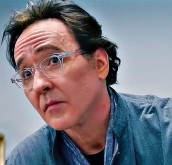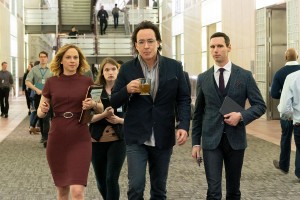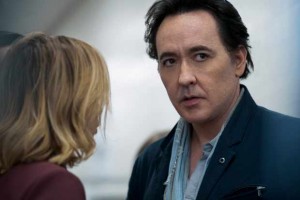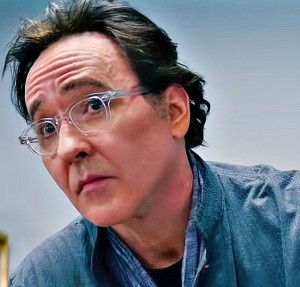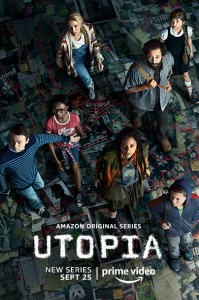UTOPIA is now in its first season on Amazon Prime, with new episodes premiering on Fridays. Based on the British series created by Dennis Kelly, UTOPIA has been adapted as an American-set version by executive producer Gillian Flynn.
John Cusack plays biotech mogul Kevin Christie, who we initially see being a good family man. At the supper table, Kevin encourages his wife and kids to talk about whatever they’ve accomplished during the day. But there’s a darker side to Kevin’s ambition and his persuasiveness.
How is Kevin connected to the comic book UTOPIA, and its precursor, DYSTOPIA. We learn early on that he has marshaled a lot of resources to get his hands on the only copy of UTOPIA, which provides hints to real-world events. The book is currently in the hands of a group of comic book fans, plus one of its characters, Jessica Hyde (Sasha Lane), who turns out to be a real person. Could Kevin be the inspiration for the comic book’s villainous Dr. Rabbit? We don’t know yet.
Cusack, originally from Illinois, is the star of a number of both comedic and dramatic films from the ‘80s through the present. A few of his movies include EIGHT MEN OUT, SAY ANYTHING, THE GRIFTERS, GROSSE POINTE BLANK (Cusack also co-wrote the screenplay), BEING JOHN MALKOVICH, HIGH FIDELITY (again, Cusack collaborated on the script), MARTIAN CHILD, and LOVE AND MERCY. Kevin in UTOPIA is Cusack’s first series regular role.
This interview is a combination of a Q&A panel hosted by Amazon Prime as part of their portion of the virtual Summer 2020 Television Critics Association (TCA) press tour, and a subsequent virtual roundtable with Cusack.
What attracted Cusack to the role of Kevin Christie? “Well,” Cusack says, “first of all, it’s Gillian Flynn doing a conspiracy thriller, so that alone is exciting enough. And when I read the scripts, I got to read them all, I was constantly shocked and surprised, and [where the story went] felt inevitable, but only in retrospect. So, you had sophisticated, cool writing, and a really intense, wild world that she created. One thing that I think is great about the piece is that, if you think you have the characters pegged in the first couple episodes, the next episode, it’s all going to be flipped on its head, and up is going to be down, and black is going to be white, and that keeps going on, and even when you think you have this thing pegged by the seventh episode, in the eighth episode, you end up going down a different rabbit hole, and you’re looking at a different Cheshire Cat. It’s very hard to pull off that kind of writing, that kind of architecture. And I would say Gillian is a master at that.”
Speaking specifically of his character, Cusack adds, “Kevin Christie is one of these guys who wakes up, and he’s a biotech visionary, he’s got his hands in Big Pharma, medicine, vaccines, alternative foodstuffs, he’s into green energy. So, he’s one of these guys that we see a lot of these days. I think the definition of who’s a good guy and who’s a bad guy in this piece gets put into a centrifuge,” he laughs. “By the end, you’re not quite sure if you’re even capable of understanding who’s a good guy and a bad guy. But I saw him as, in some ways, he was like a biotech TED Talk version of Willy Wonka, as f***ed up as that sounds.”
Cusack often manages to bring a sense of moral ambiguity to his characters, finding the sympathy in killers and the dark side of charmers. Cusack agrees this is something he can do in his work, “but I think it has to be in the bones of the writing. If you look at a film like THE GRIFTERS, it’s [based on a novel by] Jim Thompson, and these are all criminals, but you’re looking at the psychology of why would a con man feel the need to lie. It was almost a con man’s world, but [seen] through OEDIPUS, in some strange way. Themes about your easy judgments about good and bad, right and wrong, criminal/straight citizen, purposely, the dramatists or the writers or the filmmakers want to get deeper inside that, and get past a lot of these easy snap judgments. So I think that’s a sign of good writing. You’re also attracted to that.”
The challenge, Cusack continues, is to avoid being typecast. “When you’re starting out as an actor, if you’ve done something that people like, they want you to do it again, or they want you to be a leading man, and be very likable. So I was thinking about how could you subvert that. But that’s just the artistic kind of sensibility, probably, and then you just try to find material that allows you to do it.”
Ambiguity is one of the things Cusack likes most about UTOPIA. “I think there might be a larger point, that ambiguity is a lost virtue in movies in some ways, because if you watch some of the great films in the ‘70s, or even earlier films in the ‘50s and ‘60s – if you watch Carol Reed’s great film THE THIRD MAN, all the people are tired, they’re exhausted, they’ve been failures, they’re trying to make their way through the world, but they all know everything, and they’re all trying to do their best to keep going, right? So there’s that kind of feel to it. I think nowadays, people want easier black-and-white things, and the ambiguity’s been lost. So it’s interesting. Somebody said, ‘How do you feel about HIGH FIDELITY? Now that it’s been twenty years, people are thinking, maybe he’s not such a role model.’ I’m like,” Cusack makes his voice incredulous, “‘Role model?!’ I want to say, ‘Is it true? He’s an a**hole. Is he human, does he have all these frailties?’
“So the ambiguity, or the moral contradictions of the character, are what’s interesting and dramatic. I don’t know if a movie like that would get made by a studio today, because people would say, ‘This lead isn’t sympathetic. Look at all of these terrible things he does.’ But the terrible things that he does in the movie are things that probably you and I have done. We all know people who have done it. Not all of them, but we’re all frail, f***ed-up human beings, who make lots of mistakes, and try to do our best, and get it wrong, get it right. So it is a weird thing. I love ambiguity in that way, to get into that space. And it definitely is something you have to either put into a piece, or you see it in the writing and recognize it and jump towards it.
“When you hear standup comedy, it can be edgy stuff, but if it rings true, it’s because it’s gotten into the sweet spot of what we’d like to be, our perception of ourselves, and what really happens. And in between those two things is drama and comedy. Nobody wakes up in the morning and says, ‘I’m going to do a really terrible job today, and be a bastard, and really f*** up. That’s not how people are.”
How would Cusack describe UTOPIA’s genre? “I haven’t seen anything quite like this. I guess the genre would be the conspiracy thriller. When I was a kid, we had CLOSE ENCOUNTERS OF THE THIRD KIND. There’s Richard Dreyfuss, driving in the truck. Something happens, and then he has to figure out what it is. It has a fantastic, supernatural element to it, and then he has to get past the government structures, and the big business, and you have the story of a little guy who’s trying to figure out what the government, or the foreign entity, the corporation, what’s really going on, and find out the truth. So I think there’s a great tradition of those kinds of conspiracy thrillers.
“This one is kind of a meta version of that, too, because what we think we know that’s in an underground comic book that has Nostradamus-like clues about the future that people have decoded, and then find out that the comic book is real, and the characters who love the comic book are meeting people in the comic book, and start becoming part of the plot in it. It’s a very inventive piece. It’s a conspiracy thriller, but it also has shades of Kafka and Charlie Kaufman in a weird way. I’m not quite sure what the genre is, but that element of the conspiracy thriller and those genres, like THE PARALLAX VIEW, or THE MANCHURIAN CANDIDATE, where you know there’s more going on than meets the eye, and there are sinister forces at work, and the protagonists are trying to discover what those are, and what their relationship is to them, and you’re on the edge of your seat to know what happens next, and when the good ones come about, you can never really predict that, and that’s when you come into really great writing.”
UTOPIA has sequences of extreme violence. What does Cusack think these moments do for the storytelling? “There’s the contrast between all the geeks of the [fan convention circuit] and cosplay characters who think of violence in a comic book way, versus the contrast when the story of the comic book comes to life and they have to meet the actual characters in the comic. So I think the tone of that violence is about contrast, too. If you watch DR. STRANGELOVE, there’s this whole theme when Sterling Hayden has gone totally nuts and the U.S. Army has to come in and invade their own fort. That violence looks very real, but when you contrast it to the insanity of Sterling Hayden in that office with Peter Sellers, it takes on a whole different tone. So you can’t just talk about violence in isolation. You have to talk about what it’s in contrast to and how it’s enveloped into a story. Sometimes violence is surreal because it comes out of nowhere, or you might not be expecting it. So I think it’s definitely a solid take on it. I don’t think it’s gratuitous; it’s with purpose.”
The outbreak of a deadly virus, and behind-the-scenes machinations regarding its control, is a major plot point in UTOPIA. The first season was shot before the COVID-19 pandemic. How does Cusack think the show plays now?
“When we started it, the pandemic wasn’t happening. But the themes of this fantastic gang of people who are obsessed with UTOPIA, who know that within UTOPIA lies a roadmap or a secret to a dystopic or apocalyptic future. That included viruses, it included famine, it included perhaps a nuclear accident. So, the theme itself covered a lot of that, but it was disturbing and surreal to see it come so close to life with the pandemic.
“You’re also watching all these characters and their relationships, and these friendships grow, and you’re having alliances being formed. And then there’s also these two comic books, they not only tell you about the past, but they’ll tell you about the present and the future. So, there’s an element of a mystery that this unlikely group is getting together to solve, and you really fall in love with this crew that’s trying to solve it. And then, how the worlds of science, and how the authorities and the feds and the government and all that stuff, how that all kind of comes into it is a mystery to be revealed. But I think that there’s a lot of fun in it, so even though it has the idea of Utopia and Dystopia there, it doesn’t feel like a docudrama in any way.”
A lot of UTOPIA’s characters come together at a fan convention. Does Cusack have any experience being a guest at such events? “I had a really good experience. I’d never been to one and then I made a couple of horror movies that people liked. So, they said, ‘You’ve got to come to this Comic-Con.’ The thing that you get in Hollywood, when you do a panel or if people are doing Q&As after a movie, sometimes people are a little bit too cool for school or whatever. But these people [the convention attendees] were so into the movies, and they asked such informed, detailed questions, and they knew everything about the film. They were like, ‘Why did you do this thing here? And in the third act the character did this; did you know what you were doing?’ They were just so into it that it sort of made you fall in love with the moviemaking again, too. I was very surprised. The Comic-Con people – it’s a very cool, little, weird culture. It’s like people who want it to be Halloween every weekend. They just want to dress up and fly their freak flag and they love what they love and they’re into their movies.”
Regarding the final episode of UTOPIA Season 1, Cusack teases, “It’s pretty wild. I’d tell you what it is, but you wouldn’t believe me.”
Related: Interview with creator and executive producer Gillian Flynn on Season 1 of UTOPIA
Follow us on Twitter at ASSIGNMENT X
Like us on Facebook at ASSIGNMENT X
Article Source: Assignment X
Article: Interview with UTOPIA star John Cusack on Season 1 of the Amazon series
Related Posts:




